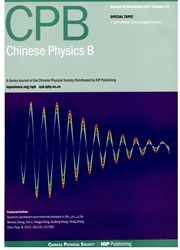

 中文摘要:
中文摘要:
The effect of irradiation on the strain sensitivity coefficient of strain sensing fiber Bragg gratings (FBGs) has been investigated through experiments. FBGs were fabricated in single mode fibers with 3 tool% Ge-concentration in the core and with a H2-1oading treatment. In experiments, the FBGs were subjected to y-radiation exposures using a Co6~ source at a dose-rate of 25 Gy/min up to a total dose of 10.5 kGy. The GeO defect in fiber absorbs photons to form a GeE' defect; the interaction with H2 is a probable reason for the y-radiation sensitivity of gratings written in hydrogen loaded fibres, The effect mechanism of radiation on the strain sensitivity coefficient is similar to that of radiation on the temperature sensitivity coefficient. Radiation affects the effective index neff, which results in the change of the thermo-optic coefficient and the strain-optic coefficient. Irradiation can change the strain sensitivity coefficient of FBGs by 1.48%-2.71%, as well as changing the Bragg wavelength shift (BWS) by 22 pm-25 pm under a total dose of 10.5 kGy. Our research demonstrates that the effect of irradiation on the strain sensitivity coefficient of FBG is small and that strain sensing FBGs can work well in the radiation environment.
 英文摘要:
英文摘要:
The effect of irradiation on the strain sensitivity coefficient of strain sensing fiber Bragg gratings (FBGs) has been investigated through experiments. FBGs were fabricated in single mode fibers with 3 tool% Ge-concentration in the core and with a H2-1oading treatment. In experiments, the FBGs were subjected to y-radiation exposures using a Co6~ source at a dose-rate of 25 Gy/min up to a total dose of 10.5 kGy. The GeO defect in fiber absorbs photons to form a GeE' defect; the interaction with H2 is a probable reason for the y-radiation sensitivity of gratings written in hydrogen loaded fibres, The effect mechanism of radiation on the strain sensitivity coefficient is similar to that of radiation on the temperature sensitivity coefficient. Radiation affects the effective index neff, which results in the change of the thermo-optic coefficient and the strain-optic coefficient. Irradiation can change the strain sensitivity coefficient of FBGs by 1.48%-2.71%, as well as changing the Bragg wavelength shift (BWS) by 22 pm-25 pm under a total dose of 10.5 kGy. Our research demonstrates that the effect of irradiation on the strain sensitivity coefficient of FBG is small and that strain sensing FBGs can work well in the radiation environment.
 同期刊论文项目
同期刊论文项目
 同项目期刊论文
同项目期刊论文
 A novel interferometric fiber optic gyroscope with random walk fault diagnosis for space application
A novel interferometric fiber optic gyroscope with random walk fault diagnosis for space application Parameters optimization of interferometric fiber optic gyroscope for improvement of random walk coef
Parameters optimization of interferometric fiber optic gyroscope for improvement of random walk coef Effect of Color Center Absorption on Temperature Dependence of Radiation-Induced Attenuation in Opti
Effect of Color Center Absorption on Temperature Dependence of Radiation-Induced Attenuation in Opti 期刊信息
期刊信息
